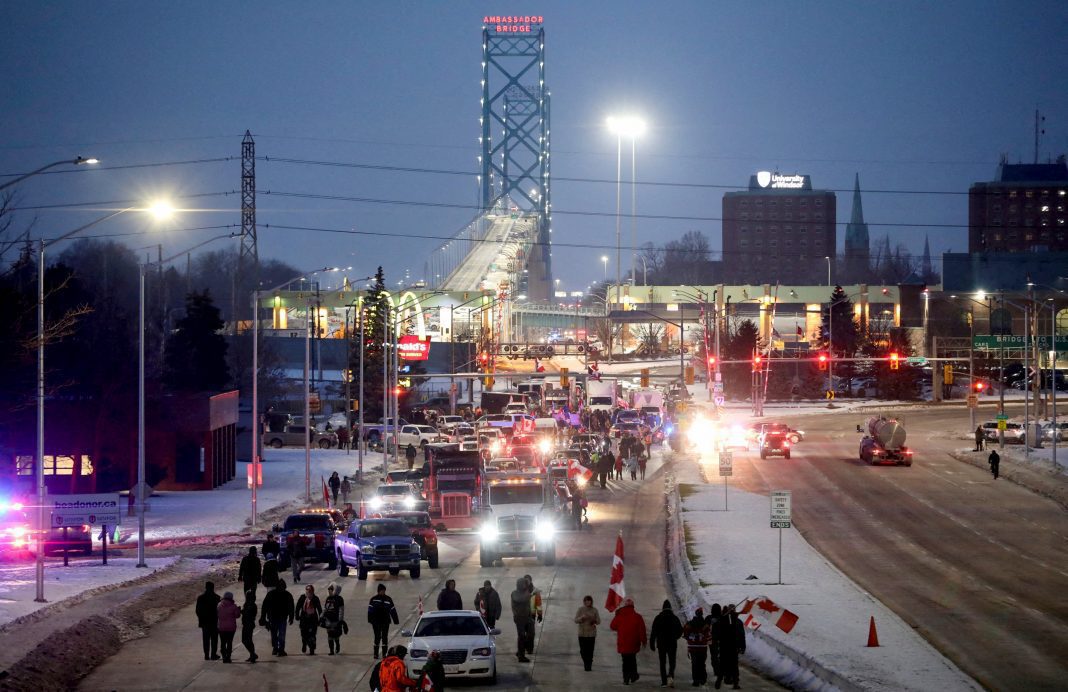Protests organized by truckers opposed to mandatory vaccination rules have stretched to nearly two weeks in the Ottawa, Ontario area, and disruptions caused by the disgruntled drivers and others who support them have begun to affect production at automakers in Detroit. Trucks blockading the Blue Water and Ambassador bridges linking Ontario with Michigan have prevented parts from crossing from Canada into the U.S., and vice versa.


The protesting truck drivers and their supporters have been clogging Ottawa’s downtown region, demanding that the Canadian government lift the mandate for truckers to receive COVID-19 vaccinations to cross into the United States. Additional demands have also been added including removal of all pandemic restrictions and Prime Minister Justin Trudeau’s resignation. So far, the government has been steadfast, not relinquishing to pressure from the protesters.
The Ontario Trucking Association distanced themselves from the protests, stating on their website, “It appears that most protesters have no connection to the trucking industry and have separate grievances beyond the cross-border vaccine requirements.
“As these protests unfold, OTA asks the public to be aware that many of the people you see and hear in media reports do not have a connection to the trucking industry and do not represent the view of the Ontario Trucking Association or its members.”
Compounding the chaos
The Ambassador Bridge linking Ontario and Michigan accounts for around 20% of all trade between the two nations, and blockades have already seriously impacted the auto industry that’s already fragile from parts shortages.
On Tuesday, Stellantis sent an assembly shift home from a plant in Windsor, ON. Their statement read, “Stellantis confirms that the Windsor Assembly Plant had to cut short its two shifts on Tuesday due to parts shortages resulting from the Ambassador Bridge closure, however, production resumed Wednesday morning. Additionally, the first shift at the Brampton Assembly Plant was shortened on Wednesday. The second shift is expected to report as scheduled. We continue to work closely with our carriers to get parts into the plants to mitigate further disruptions.”
Ford’s Windsor engine plant is also suffering from parts shortages along with assembly in Oakville. “While we continue to ship our current engine inventory to support our U.S. plants, we are running our plants at a reduced schedule today in Oakville [Ontario] and our Windsor engine plant is down,” Ford said in a statement.
Toyota’s assembly at three plants, on the Canadian side, has been shut down with parts simply not flowing between the two countries.
And in Detroit, GM cut a shift at the Lansing, MI plant due to parts supply issues related to the blockade.
| Related: Where does the semiconductor chip shortage stand today? |
No end in sight
Protests began with the trucking industry but have largely morphed into demonstrations from all groups who believe government-mandated restrictions should end immediately. It’s a fragile situation that could turn ugly since the group’s demands continually change and don’t have a specified leader. It’s not fully known what actions will disperse the crowds, particularly without becoming violent.
The disruptions at the border make the squeeze on the auto industry even more painful.
It’s worth noting that, for truckers, lifting Canada’s vaccine mandate would not allow them entry to the United States since the American restrictions prevent unvaccinated truckers from crossing into the country.
Did you enjoy this article from Jason Unrau? Read other articles on CBT News here. Please share your thoughts, comments, or questions regarding this topic by submitting a letter to the editor here, or connect with us at newsroom@cbtnews.com.
Be sure to follow us on Facebook and Twitter to stay up to date or catch up on all of our podcasts on demand.
While you’re here, don’t forget to subscribe to our email newsletter for all the latest auto industry news from CBT News.










